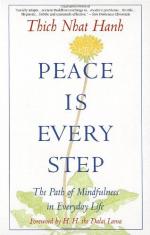
|
| Name: _________________________ | Period: ___________________ |
This test consists of 5 multiple choice questions, 5 short answer questions, and 10 short essay questions.
Multiple Choice Questions
1. What gift does holding a grandchild give to the grandparent?
(a) Honor.
(b) Love.
(c) Hope.
(d) Great joy.
2. In which river did the author wash his face?
(a) The Ohio River.
(b) The Charles River.
(c) The Mississippi River.
(d) The Nile River.
3. Realistically, who can benefit from an individual's mindful living?
(a) Those who are suffering.
(b) Relatives and close friends.
(c) People who are in daily contact.
(d) The world.
4. According to Hanh, what would improve the power of hugging?
(a) Combining hugging with a smile.
(b) Hugging only when the feeling is shared.
(c) Hugging only when the feeling is genuine.
(d) Combining hugging with mindful breathing.
5. What would have prevented the tremendous amount of destruction in Vietnam?
(a) A Vietnamese vision of duality.
(b) An American vision of duality.
(c) An American vision of non-duality.
(d) A Vietnamese vision of non-duality.
Short Answer Questions
1. What can be transformed into healthy energy by recognizing that it is part of oneself?
2. What is the basis for real strength when one tries to make a change in the world?
3. Which plant is used in Hanh's story about people looking for the reason why it failed to grow?
4. What should one do as angry feelings subside?
5. According to Hanh, when must one recognize negative feelings?
Short Essay Questions
1. Explain the Buddhist concept of non-duality. Give an example.
2. Why is Hanh surprised to find that the Charles River is not a safe place to wash one's face? According to Hanh, how can dead rivers be resurrected?
3. What effect does conscious breathing have on a hug? Why?
4. After calming an unpleasant feeling, what two additional steps should be taken to insure that the negative emotion is eradicated completely?
5. In "Understanding" Hanh explains that understanding and love are one thing. Why can the two not be separated?
6. What must happen to the knots before peace can be found?
7. What two types of seeds does consciousness include? Explain the relationship between the two. Why is it important to plant positive seeds?
8. What is the Buddhist concept of "interbeing?" Hanh gives an example of interbeing by stating that poverty cannot exist without wealth. Give at least two other similar examples.
9. What instructions on meditating does Hanh give the reader in "Meditation on Compassion"? Why would it be more beneficial to meditate on someone who is obviously suffering?
10. What counting analogy could be compared to Hanh's breathing mindfully when one feels anger rising?
|
This section contains 871 words (approx. 3 pages at 300 words per page) |

|




